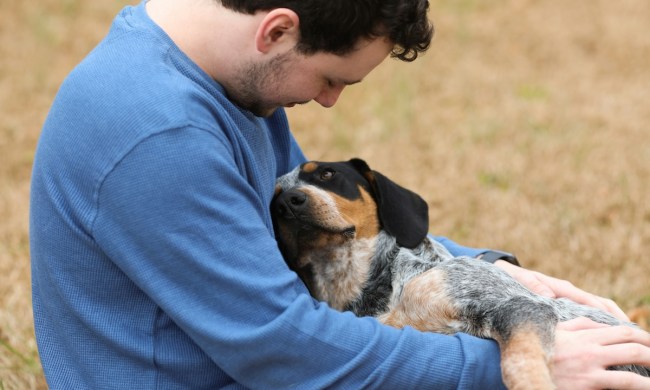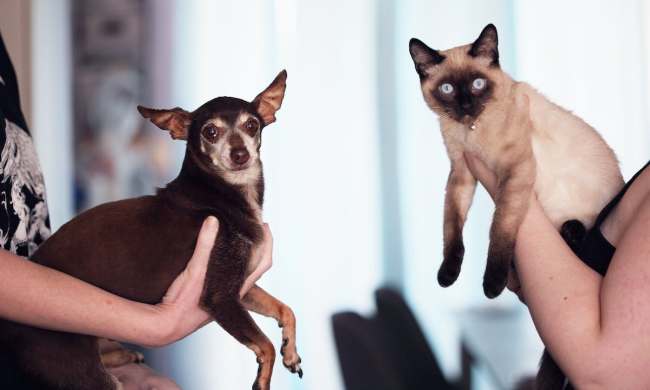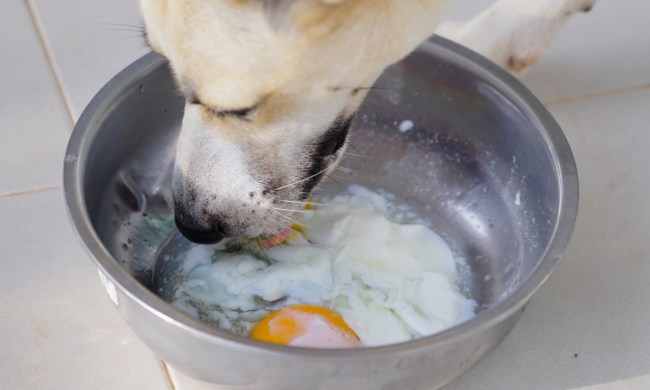Your dog is your best friend, and you’ve been through a lot together. From walks in the park to daily snuggles on the sofa, you share almost everything with your pooch. One thing you don’t want to share? Your food. If you’re noshing on chocolate or a full plate of spaghetti, you should know that many human foods are actually toxic to your pup and should never be shared.
But even if you’re eating a pet-safe snack, like a turkey sandwich, you probably don’t want your beastie begging for food every time you sit down to a meal. Have you ever wondered what prompts a dog begging for food when they get plenty to eat? We’re here to dish out the scoop on why pooches beg and how you can get them to stop.
Is dog begging a learned behavior?

Looking into your pup’s big, sad eyes while he begs for table scraps is enough to tug at your heartstrings. While it might be tempting to slip him a few bites every now and then, reinforcing this behavior will only make begging worse, and it can lead to additional behavioral problems later on.
Every time you reward your pup with a bite of your food, you’re teaching him that begging will get him what he wants. Fortunately, this is a relatively easy one to correct. Stop giving in to your dog when he asks, and he’ll eventually realize that no amount of whimpering — or gazing up at you with his trademark puppy eyes of sadness — will earn him a treat from the table.
Why do dogs beg?

We can thank our dogs’ ancestors — gray wolves — for their tendency to beg. Wolf pups whine to get attention and affection from their mothers, and even adult wolves have been known to whine as a show of submission and an expression of friendliness. In most cases, our dogs whine when they beg, though they may also put their head on our knee, wag their tail, or bark to let us know they want a treat. Interestingly enough, dogs usually don’t beg because they’re hungry.
Modern-day pups are fed frequently, so they never have to go without a meal. However, their ancestors were scavengers, so the urge to beg for extra food is hard-wired into their behavior. The impulse to beg is an instinctive response that stems from their ancestors’ “feast or famine” lifestyle. It’s no wonder today’s dogs tend to overeat when they have the chance. Instinct tells them they should eat while they can because they may not have another meal for quite some time.
Lastly, dogs beg because we’re helpless to resist their sweet faces. Unfortunately, giving in and sharing scraps from the table only helps to reinforce their begging. When it comes time to break your dog of the habit, you’ll want to make sure the whole family is on board. Children may find it especially difficult to resist a begging dog, so you should keep a close eye on what your kids feed your pooch.
Why is dog begging bad?

Sure, it can be obnoxious when your dog interrupts mealtime to beg for scraps, but you may be wondering, “What’s so bad about my dog begging for food?” Well, it’s a bit complicated. Your family is your dog’s pack, and rewarding him for begging sends the message that your pup has a measure of control over the pack. While the notion of a bossy, demanding dog sounds entertaining in theory, the reality is that encouraging your dog to beg can actually cause him to become aggressive when he doesn’t get his way.
How to stop your dog from begging

When it comes to putting a stop to your dog’s begging, the American Kennel Club recommends a three-prong approach:
- Feed your dog first, and make sure he has his meals in a different room than where you eat. Feeding your dog before you have dinner helps keep him distracted from what you’re eating. Additionally, taking your pup to a room that isn’t your main dining area can help prevent begging before it starts.
- Train your dog to follow commands can help stop instinctive begging. A well-trained dog makes for a happy household, so you must teach your dog basic commands. If your pup starts to beg, tell him to “sit.” You can also redirect your dog’s attention with a chew toy or a puzzle feeder to keep your pup occupied while you eat.
- Reward your pup when he behaves. Instead of giving your pup a dog treat at the table, which will only confuse him, make sure you reward your dog after getting up from the dining room table. Wait until your pooch is sitting calmly or playing with his toy, and then reward him for staying away from the table while you eat. Positive reinforcement is much more effective than punishing your dog, so stick to the reward system when he behaves instead of scolding him when he misbehaves.
How do I know if my dog is hungry or just greedy?

It’s very rare for a modern, well-cared-for pet to go hungry, but certain health conditions can cause your pet’s stomach to growl. When they get their dinner, you usually want him to finish the whole bowl and still look up eagerly for more. That’s normal! It doesn’t mean your pup actually needs more calories — they just lovs the way food tastes like you might enjoy a second helping of dessert.
A couple of medical conditions, like a thyroid problem, can cause insatiable hunger. Mention all symptoms to your vet as their annual checkup and a simple blood test can diagnose many of these. Lastly, if you recently switched food or your fur baby has been put on a diet, expect some extra fussiness around meal times.
Dinner time is meant to be enjoyable and relaxing, but it can quickly turn into an annoyance if your dog constantly begs for scraps. Fortunately, begging is a learned behavior, and you can help your dog unlearn it by following our tips. When in doubt, feed your pup in a different room, train them to follow basic commands, and reinforce good behavior with treats and attention.




